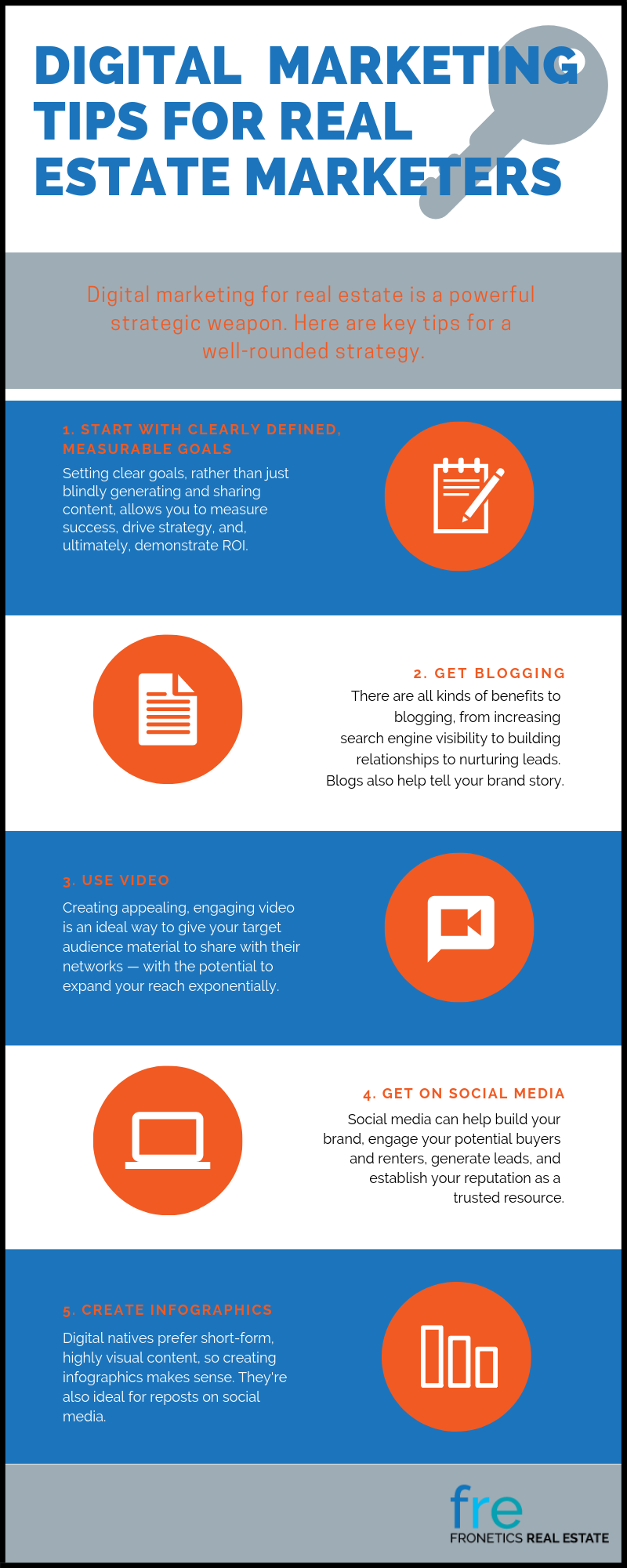Posts Tagged "blogging"

Infographic: 5 Tips to Make Digital Marketing for Real Estate Count
Digital marketing for real estate is a powerful strategic weapon. Our infographic gives you some key tips for a well-rounded strategy.
Highlights:
- 88% of all home buyers use the internet to collect information, and for 43%, an online search is their first step.
- When you kick off digital marketing for real estate, setting clear goals, rather than just blindly generating and sharing content, allows you to measure success, drive strategy, and ultimately, demonstrate ROI.
- Video is an ideal way to give your target audience material to share with their networks — with the potential to expand your reach exponentially.
As the realm of marketing has undergone a seismic shift in the past decade, digital marketing for real estate has taken off. According to the National Association of Realtors, 88% of all home buyers use the internet to collect information, and for 43%, an online search is their first step. Real estate marketers are increasingly targeting their efforts on digital media, and content marketing is one of the best ways to do this.
Our infographic below represents our favorite digital marketing tips for real estate marketers. Read on for ways you can use this powerhouse tool to market your brand and properties.
Digital marketing for real estate — 5 tips
1) Start with clearly defined, measurable goals
Effectively selling or leasing property requires a comprehensive, data-driven approach to marketing — which means starting with clearly defined, measurable goals. Are you looking to generate more leads? Raise brand awareness? Grow your social media presence? When you kick off digital marketing for real estate, setting clear goals, rather than just blindly generating and sharing content, allows you to measure success, drive strategy, and ultimately, demonstrate ROI.
2) Get blogging
Blogs help you sell real estate. Period. There are all kinds of benefits to blogging, from increasing search engine visibility to building relationships to nurturing leads. The more you publish, the higher you’ll rank with search engines. And every time you publish a blog post, you increase the chances that a user searching online for real estate will find your website.
Blogs also help tell your brand story. They help buyers imagine themselves in your space. They nurture leads and build trust among potential buyers. In a recent audit of a client’s website, we found that people who read the blog converted at an almost 30% higher rate than other web traffic. That’s significant.
3) Use video
If you’re a frequent reader of our blog, you’ll know that we’ve been writing about the astronomical rise of video in real estate marketing for a while now. We can’t stress it enough: video is here to stay, and it’s time your business starts embracing it as a highly effective content marketing tool.
Part of what makes video such an appealing form of content is its inherent shareability, which drives organic traffic. Getting your content and properties out to your base audience is one thing but empowering that audience to be your ambassadors is a huge next step. Creating appealing, engaging video is an ideal way to give your target audience material to share with their networks — with the potential to expand your reach exponentially.
4) Get on social media
Real estate is a people business. That’s why you should leverage a marketing tool that is also all about people: social media. If you have not begun developing social media strategies for your real estate business, now is the time to get started.
Consider for a minute that in 2017, 81% of Americans had at least one social media profile. And the numbers are projected to continue skyrocketing: by 2020, 200 million people just in the U.S. are estimated to be on social media. Used wisely, social media can help build your brand, engage your potential buyers and renters, generate leads, and establish your reputation as a trusted resource.
5) Create Infographics
Infographics can be one of the most effective mediums for digital marketing for real estate. We know that digital natives, who make up the majority of real estate buyers today, prefer short-form, highly visual content. So, infographics make a lot of sense when it comes to speaking their language. Infographics are also prime candidates for reposts on social media.
Since the text in infographics isn’t readable by search engines, you can make the most out of your content and bump up your SEO by including a transcript of your text with your graphic, ideally at least 350 words.
Final thoughts
Online searches have changed real estate marketing for good. In fact, the possibilities that digital marketing offers are varied, constantly evolving, and exciting. Savvy real estate marketers are using quality content to raise brand awareness, improve SEO, build relationships, and generate leads.
Related Posts:
- A Visual Guide to Social Media Posting Frequency for Real Estate
- 10 Social Media Statistics for Real Estate Marketers 2018
- 10 Quick Ways to Grow Brand Awareness
Posts Tagged "blogging"

July 6 is One of the Busiest Days of the Year for Real Estate Searches
Real estate searches peak after holidays, and July 6 is one of the biggest peaks of the year. Are you ready to make the most of it?
If you’re a real estate marketing professional who puts your feet up after the holidays — it’s time to reconsider your strategy. Unlike the post-holiday retail lull, real estate searches actually pick up as potential buyers use their downtime to go online to consider real estate investment.
Now is your chance to capture those leads.
Here’s how to take advantage of the post-Fourth of July uptick in real estate searches.
Publish blog posts on a normal schedule
We all know that blogging can help you sell real estate in all kinds of ways — from increasing search visibility to nurturing leads. But did you realize blog posts are the gifts that keep on giving? The majority of traffic will visit your posts months after they’re published. We’ve found that 80% of our page views occur on blog posts published at least six months prior. Bear that in mind when you’re creating your editorial calendar: to capture future searches, the six-month mark can be a great time to write about trends or happenings in the coming year.
Search engines reward consistency and predictability in your publishing schedule. So, keep your normal frequency throughout the year, and it will help your rankings during high-traffic times.
Be strategic about social media to capitalize on real estate searches
Social media management can be an extremely time-consuming task, so dialing back your posting on the days when you know that prospects won’t be spending time online can help you conserve resources for the high-traffic days. July 6 is definitely a day when you should maximize your social media output, both in terms of frequency and quality. This doesn’t mean posting constantly, but it does mean it’s a great time to unveil new content, post interesting statistics, and interact with your followers. Chances are, many of your competitors will be shut down for the holiday, and your posts will be front and center in your prospects’ newsfeeds.
Be strategic about digital advertising
The same goes for digital advertising. Knowing that July 6 is a big day for real estate searches, you should budget your pay-per-click and social advertising dollars to spend more on this day. It’s a good time to focus particularly on your Google AdWords spend, as that will capture prospects using search engines to find information about potential real estate investments — as opposed to sponsored social posts, which display your ads in the newsfeed of a prospect who may or may not be ready to buy.
Post-holiday real estate searches present a big opportunity. Seize it.
Related posts:
- 10 Social Media Statistics for Real Estate Marketers 2018
- How to Measure Brand Awareness: A Guide for Real Estate Marketers
- Top 10 Real Estate Marketing Posts 2017




